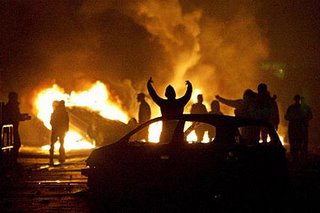Riots in France

Street-fights against the police, hundreds of cars and public buildings such as schools burning each night – we do not speak about Baghdad here. The location is Paris and one could ask which war is going on. No foreign army invaded the suburbs (banlieues) of the city: it is the French minister of the interior, Nicolas Sarkozy, who announced a “cleaning” of the suburbs from a revolting youth that he calls “rabble”.
The conflict is not a new one but a late result of France´s colonial past. When in the 1960s, after the bloody Algerian war of independence, France lost its colonies in North Africa, many people from there immigrated to the former “mother country”. The good thing is that these people and their children could get the French citizenship without many problems. The stars of the French national football-team (as Zinedine Zidane or Thierry Henry) that won the world-championship in 1998 are nearly all from a North African background.
But in most cases the Arabian and African immigrants were not integrated well in society. They were settled in the outskirts which often developed to isolated parts of the cities offering bad opportunities for education and employment to the young people. Alienation and poverty often leads to a rise of criminality and the growing social crisis then breeds conflicts. Here it was the confrontation of an (often aggressive) police with a new counter-culture who found its representatives in the heroes of the French Hip-Hop-scene. Riots as the ongoing ones were not too seldom in the last years, but never as big as today.

In 1995, film director Matthieu Kassovitz shot a black and white-movie about the situation of the youth in the banlieues with the title “La Haine” (“Hate”). In this movie, that remembers so much at the present situation since last week, the killing of a young guy by the police leads to riots. A friend of the murdered person finds a gun and swears that he will kill a cop …
The whole conflict refers on the ambivalence of a nation that had proclaimed the ideas of a humanist revolution and then fell back into nationalism and colonialism. The revolutionary constitution guarantees equal rights to everybody, but the actual politics look different. As far as I understand it, minister Sarkozy does his best to become the new protagonist of an ignorant and chauvinistic France that does not want to be faced with its real problems. The practice of getting the unemployed “rabble” out of the city fits well to that attitude. Therefore the hate of the young rebels focuses on him: it is there aim to get him out of his position. On the other hand, his law-and-order-politics and his “zero tolerance”-motto (in “best” GWB-tradition) makes him popular among the right-wing voters – and so the splitting of the nation continues. The violence now swept over even to smaller towns.
Simple solutions will not make it, but something has to be done. Let´s hope that the humanitarian spirit of 1789 will overcome this madness!


2 Comments:
any group which is oppressed will react..this is what is happening in france.and believe me it is going 2 happen in more and more countries..
Yeah i kind of agree with Siddharth, but being opressed doesn't give you the right to burn stuff. I'm sure that it may have started off as a genuine outlet for pent up anger and frustration, but then they're burning their own cars and schools. Its like safety in numbers, and they know they cant be prosecuted.
Looks like you finally have a government Christian. When does Frau Merkel get sworn in then ?
Post a Comment
<< Home